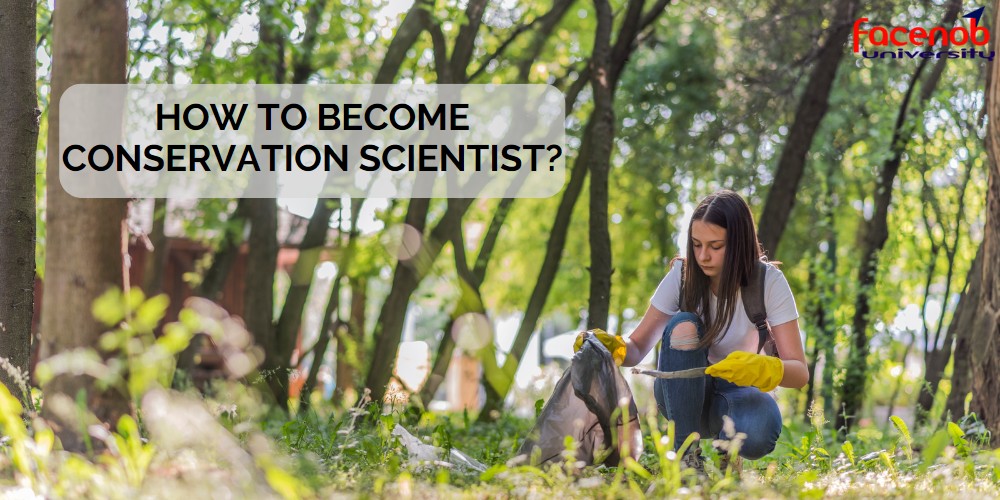How to Become Conservation Scientist?

Introduction of Conservation Scientist
Humans, animals, and natural resources have had a unique and symbiotic relationship for millennia. This relationship is now threatened due to human encroachment and damage to animals and natural resources. Conservation Scientists are professionals trained in protecting and restoring various habitats and ecosystems in the environment to make the world a better place for all species to live and thrive in.
Also Known As
- Conservation Biologist
- Environmental and Conservation Scientist
- Environmental and Conservation Biologist

Typical Job Responsibilities
What do Conservation Scientists do?
A Conservation Scientist would typically need to:
- Monitor forestry and conservation activities to ensure that natural forest habitat is protected and that government regulations are followed.
- To prevent excessive deforestation and exploitation of its natural resources, negotiate contractual terms and conditions for forest harvesting and land use.
- Create plans for managing and conserving forest lands and resources; ensure that forest-cleared lands are used wisely in the future.
- Cooperate with private landowners, governments, farmers, and other stakeholders to improve land for forestry without harming its fertility or the environment.
- Supervise other workworkers’estry activities; assist in selecting new tree planting sites; use controlled burning, bulldozers, or herbicides to clear land; and participate in forest fire suppression.
- Determine how to remove timber without harming the environment; select and prepare planting sites for new trees.
- Clear land with controlled burning, herbicides, or controlled burning; lead or participate in forest fire suppression.ion
- Collaborate with a group of conservation specialists and experts.
Standard Work Environment
Conservation Scientists work primarily in offices or laboratories, with some fieldwork in remote locations.
Traveling to natural areas is an option. You may also be required to travel to other cities or abroad to attend conferences, seminars, or workshops.
Work Schedule
Conservation Scientists work 45 hours per week, Monday through Friday, from 9 a.m. to 5 p.m. Hours may be increased due to deadlines or other fact,,ors such as travel to and from remote fieldwork locations and observation venues.
Employers
Finding a new job may appear difficult. Conservation Scientists can improve their job search by soliciting referrals from their network, contacting companies directly, using job search platforms, attending job fairs, and inquiring at staffing agencies.
Conservation Scientists are generally employed by:
- Government Agencies
- Forestry & Logging Companies
- Agriculture & Forestry Support Groups
Unions / Professional Organizations
Professional associations and organizations, such as The International Union for Conservation of Nature, are essential for Conservation Scientist who wants to further their professional development or connect with other professionals in their industry or occupation.
Membership in one or more organizations adds value to your resume while strengthening your credentials and qualifications.
Workplace Challenges
- Difficulties due to the physically demanding nature of the work
- The need to work outdoors in any weather
- The need to traverse dense woods and underbrush
- Exposure to harmful insects, poisonous plants, and dangerous animals, especially when working near logging operations or wood yards and forests
- Long working hours may cause frustration and burnou, insufficient time for one’s family and self-caone’ssks associated with working alone, in isolated areas, or engaging in fire suppression activities
Suggested Work Experience
Any academic program in which an aspiring Conservation Scientist enrolls usually includes a period of supervised experiences, such as an internship.
For aspiring Conservation Scientists, experience in environmental conservation, management, education, or planning is highly recommended. Some organizations run residential camps to help people gain practical conservation skills and experience. Volunteering abroad or assisting local conservation efforts is also highly recommended.
If you have a bachelor’s or master’s dbachelor’se enmaster’stal consultancies will provide work experience through placements.
To demonstrate your commitment to course providers and prospective employees, read about the profession and interview or job shadow experts working in conservation science.
Recommended Qualifications
A bachelor’s degree ibachelor’sental planning, environmental science, forestry, agricultural science, rangeland management, or natural resource conservation is required for conservation scientists.
Such degrees prepare aspiring Conservation Scientists for their typical job responsibilities or higher education by imparting theoretical knowledge and practical skills through biology, ecology, and forest resource management courses. These degrees may include remote sensing, computer modeling, and Geographic Information Systems technology courses (GIS).
Biology, chemistry, and computer science classes in high school help you build a solid foundation of knowledge before you go to university.
Certifications, Licenses, and Registration
A Conservation Scientist’s competence in a skilScientist’smonstrated through work experience, training, and passing an examination.
Conservation Scientists do not need to be licensed or certified to worklicensedionally, especially at the entry-level. Completing certainty-level, the other hand, may increase salary potential, improve workplace opportunities, and allow for networking with colleagues.
You must have a bachelor’s degree and several yebachelor’serience in conservation science before taking certification and licensure exams.
Projected Career Map
Career advancement is driven by performance, experience, and the acquisition of professional qualifications. Employees who consistently deliver above-average results may be eligible for advancement every two to three years.
Conservation Scientists may advance to take up managerial duties. Their fieldwork, however, may be reduced, and they will typically spend time working with teams to develop plans and supervise subordinates.
After obtaining the necessary advanced degree, you may act in research or work on policy issues.
Job Prospects
Candidates with a strong understanding of software tools such as Geographic Information System (GIS) technology and remote sensing, as well as the necessary skills and professional work ethics, stand to benefit the most.
Beneficial Professional Development
CPD will assist an active Conservation Scientideveloping personal skills and proficiency through work-based learning, a professional activity, formal education, or self-directed learning. It enables you to constantly improve your skills, regardless of your age, job, or level of knowledge.
To advance your career, you could pursue a master’s degree or a Ph.programmme. Employermaster’s candidates who have completed accredited programs offered by professional bodies.
There are several classifications within conservation science, including conservation land managers, range managers, and soil and water conservationists. Remember to obtain the necessary qualifications before pursuing any of these careers.
Once you begin working as a Conservation Scientist, you can access various training opportunities to enhance your skills. Several organizations also offer environmental certification trainiorganizationslocal budgets; your employer may pay for your courses in full or assist you in other ways as you pursue continuing professional development courses or a master’s degree program while working.
Conclusion
Climate master’s influenced scientific research and development. Concern and fear are increasing as global temperatures rise, as is the importance of Conservation Scientists. Conservation Scientists must make complex decisions that balance economic goals with environmental protection while adhering to government regulations.
Advice from the Wise
Always have fun when you’re outside. Only then will you understand how humans and naturyou’reources interact with one another, allowing for easier natural resource conservation?
Explore Also: How to Become Confectionery Chef?

I like this website it’s a master piece! Glad I detected this ohttps://69v.topn google.Money from blog